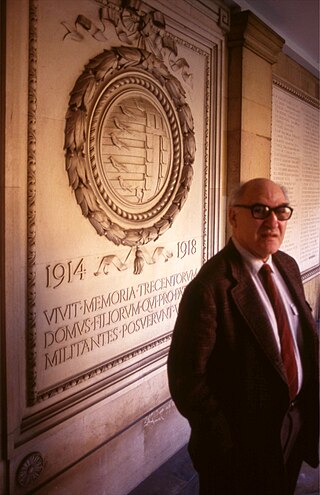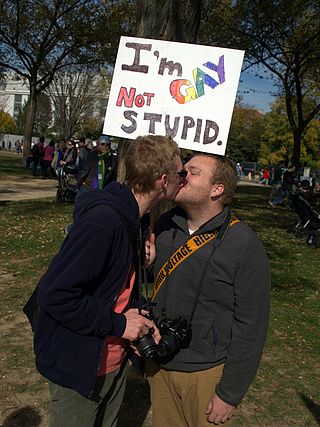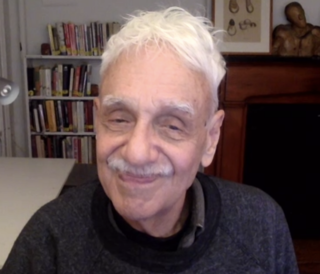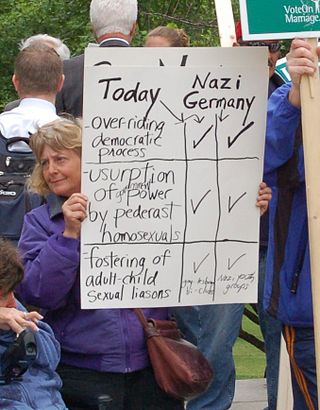Related Research Articles

Heterosexuality is romantic attraction, sexual attraction or sexual behavior between people of the opposite sex or gender. As a sexual orientation, heterosexuality is "an enduring pattern of emotional, romantic, and/or sexual attractions" to people of the opposite sex; it "also refers to a person's sense of identity based on those attractions, related behaviors, and membership in a community of others who share those attractions." Someone who is heterosexual is commonly referred to as straight.

Sexual orientation is an enduring pattern of romantic or sexual attraction to persons of the opposite sex or gender, the same sex or gender, or to both sexes or more than one gender. These attractions are generally subsumed under heterosexuality, homosexuality, and bisexuality, while asexuality is sometimes identified as the fourth category.
Queer studies, sexual diversity studies, or LGBT studies is the study of topics relating to sexual orientation and gender identity usually focusing on lesbian, gay, bisexual, transgender, gender dysphoria, asexual, queer, questioning, intersex people and cultures.

Biphobia is aversion toward bisexuality or people who are identified or perceived as being bisexual. Similarly to homophobia, it refers to hatred and prejudice specifically against those identified or perceived as being in the bisexual community. It can take the form of denial that bisexuality is a genuine sexual orientation, or of negative stereotypes about people who are bisexual. Other forms of biphobia include bisexual erasure.
Sexual identity is how one thinks of oneself in terms of to whom one is romantically and/or sexually attracted. Sexual identity may also refer to sexual orientation identity, which is when people identify or dis-identify with a sexual orientation or choose not to identify with a sexual orientation. Sexual identity and sexual behavior are closely related to sexual orientation, but they are distinguished, with identity referring to an individual's conception of themselves, behavior referring to actual sexual acts performed by the individual, and sexual orientation referring to romantic or sexual attractions toward persons of the opposite sex or gender, the same sex or gender, to both sexes or more than one gender, or to no one.
Societal attitudes towards same-sex relationships have varied over time and place. Attitudes to male homosexuality have varied from requiring males to engage in same-sex relationships to casual integration, through acceptance, to seeing the practice as a minor sin, repressing it through law enforcement and judicial mechanisms, and to proscribing it under penalty of death. In addition, it has varied as to whether any negative attitudes towards men who have sex with men have extended to all participants, as has been common in Abrahamic religions, or only to passive (penetrated) participants, as was common in Ancient Greece and Ancient Rome. Female homosexuality has historically been given less acknowledgement, explicit acceptance and opposition. The widespread concept of homosexuality as a sexual orientation and sexual identity is a relatively recent development, with the word itself being coined in the 19th century.

Societal attitudes toward homosexuality vary greatly across different cultures and historical periods, as do attitudes toward sexual desire, activity and relationships in general. All cultures have their own values regarding appropriate and inappropriate sexuality; some sanction same-sex love and sexuality, while others may disapprove of such activities in part. As with heterosexual behaviour, different sets of prescriptions and proscriptions may be given to individuals according to their gender, age, social status or social class.

Roger David Griffin is a British professor of modern history and political theorist at Oxford Brookes University, England. His principal interest is the socio-historical and ideological dynamics of fascism, as well as various forms of political or religious fanaticism.

Gerhard "George" Lachmann Mosse was an American historian, who emigrated from Nazi Germany to Great Britain, and then to the United States. He was professor of history at the University of Iowa, the University of Wisconsin–Madison, and also in Israel, at the Hebrew University of Jerusalem. Best known for his studies of Nazism, he authored more than 25 books on topics as diverse as constitutional history, Protestant theology, and the history of masculinity. In 1966, he and Walter Laqueur founded The Journal of Contemporary History, which they co-edited.

Terms used to describe homosexuality have gone through many changes since the emergence of the first terms in the mid-19th century. In English, some terms in widespread use have been sodomite, Achillean, Sapphic, Uranian, homophile, lesbian, gay, effeminate, queer, homoaffective, and same-sex attracted. Some of these words are specific to women, some to men, and some can be used of either. Gay people may also be identified under the umbrella terms LGBT.

Jonathan Ned Katz is an American author of human sexuality who has focused on same-sex attraction and changes in the social organization of sexuality over time. His works focus on the idea, rooted in social constructionism, that the categories with which society describes and defines human sexuality are historically and culturally specific, along with the social organization of sexual activity, desire, relationships, and sexual identities.
Queer theology is a theological method that has developed out of the philosophical approach of queer theory, built upon scholars such as Marcella Althaus-Reid, Michel Foucault, Gayle Rubin, Eve Kosofsky Sedgwick, and Judith Butler. Queer theology begins with the assumption that gender variance and queer desire have always been present in human history, including faith traditions and their sacred texts such as the Jewish Scriptures and the Bible. It was at one time separated into two separate theologies; gay theology and lesbian theology. Later, the two would merge and expand to become the more inclusive term of queer theology.
Gay is a term that primarily refers to a homosexual person or the trait of being homosexual. The term originally meant 'carefree', 'cheerful', or 'bright and showy'.
What constitutes a definition of fascism and fascist governments has been a complicated and highly disputed subject concerning the exact nature of fascism and its core tenets debated amongst historians, political scientists, and other scholars since Benito Mussolini first used the term in 1915. Historian Ian Kershaw once wrote that "trying to define 'fascism' is like trying to nail jelly to the wall".

Bisexuality is a romantic or sexual attraction or behavior toward both males and females, or to more than one gender. It may also be defined to include romantic or sexual attraction to people regardless of their sex or gender identity, which is also known as pansexuality.
Sexual fluidity is one or more changes in sexuality or sexual identity. Sexual orientation is stable and unchanging for the vast majority of people, but some research indicates that some people may experience change in their sexual orientation, and this is slightly more likely for women than for men. There is no scientific evidence that sexual orientation can be changed through psychotherapy. Sexual identity can change throughout an individual's life, and may or may not align with biological sex, sexual behavior or actual sexual orientation.
Christian denominations have a variety of beliefs about sexual orientation, including beliefs about same-sex sexual practices and asexuality. Denominations differ in the way they treat lesbian, bisexual, and gay people; variously, such people may be barred from membership, accepted as laity, or ordained as clergy, depending on the denomination. As asexuality is relatively new to public discourse, few Christian denominations discuss it. Asexuality may be considered the lack of a sexual orientation, or one of the four variations thereof, alongside heterosexuality, homosexuality, bisexuality, and pansexuality.
William Leap is an emeritus professor of anthropology at American University and an affiliate professor in the Women's, Gender and Sexuality Studies Program at Florida Atlantic University. He works in the overlapping fields of language and sexuality studies and queer linguistics, and queer historical linguistics.
Martin S. Weinberg is an American sociologist whose work frequently involves human sexuality. His major areas of interest include sociology of the body, sociology of deviance and control, and interpretive sociology.

There is a widespread and long-lasting myth alleging that homosexuals were numerous and prominent as a group in the Nazi Party or the identification of Nazism with homosexuality more generally. It has been promoted by various individuals and groups both before and after World War II, especially by left-wing Germans during the Nazi era and the Christian right in the United States more recently. Although some gay men joined the Nazi Party, there is no evidence that they were overrepresented. The Nazis harshly criticized homosexuality and severely persecuted gay men, going as far as murdering them en masse. Therefore, historians regard the myth as having no merit.
References
- 1 2 "Professor Erin Carlston - The University of Auckland". www.arts.auckland.ac.nz.
- ↑ Kibble, Matthew (2000). "REVIEWS: Women Intellectuals and Intellectual Fascism". Women: A Cultural Review. 11 (1–2): 161–164. doi:10.1080/09574040050051541. ISSN 0957-4042.
- ↑ Martin, Elaine (1999). "Review of Thinking Fascism: Sapphic Modernism and Fascist Modernity". The Comparatist. 23: 197–198. ISSN 0195-7678. JSTOR 44367044.
- ↑ Frost, Laura (1998). "Review of Thinking Fascism: Sapphic Modernism and Fascist Modernity". Modern Fiction Studies. 44 (4): 1069–1071. ISSN 0026-7724. JSTOR 26285356.
- ↑ Carlston, Erin G. (2013). Double Agents: Espionage, Literature, and Liminal Citizens. Columbia University Press. ISBN 9780231510097.
- ↑ Eagen, Kevin (6 November 2013). "Interview with Erin Carlston, Author of Double Agents". Critical Margins. Retrieved 3 June 2019.
- ↑ "Erin G. Carlston | Modernism/Modernity" . Retrieved 3 June 2019.